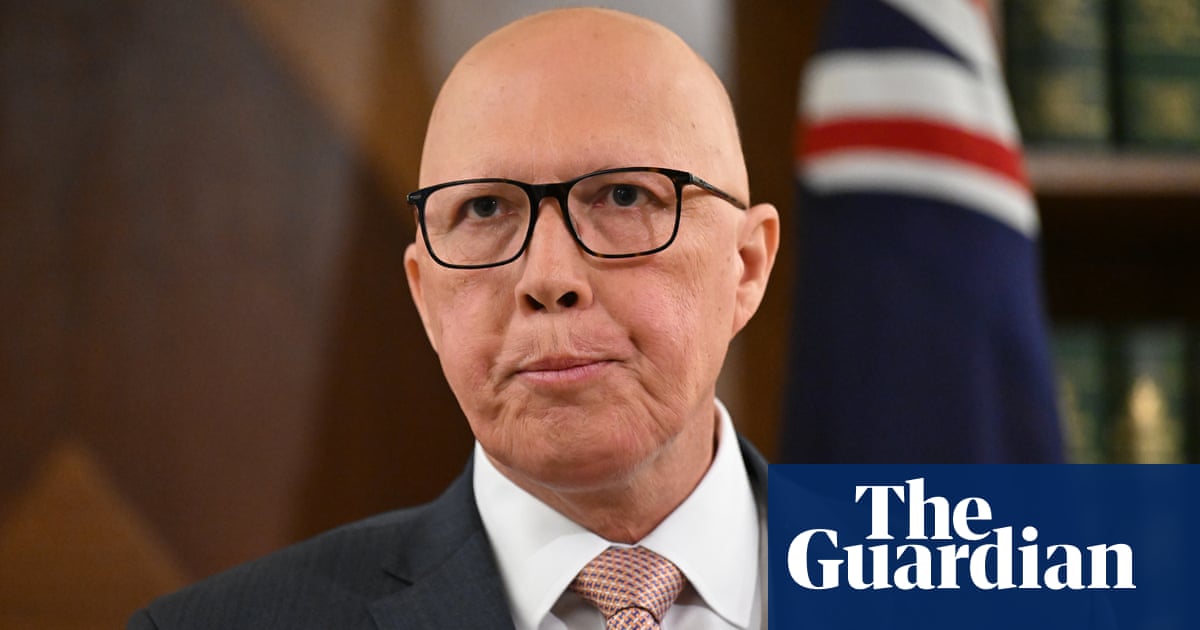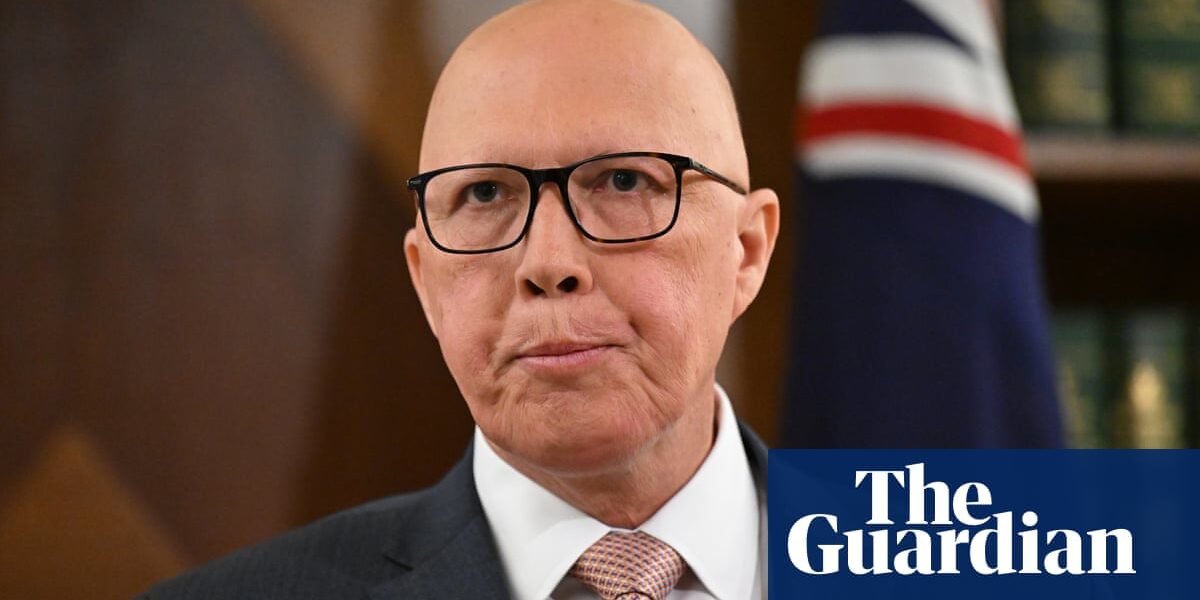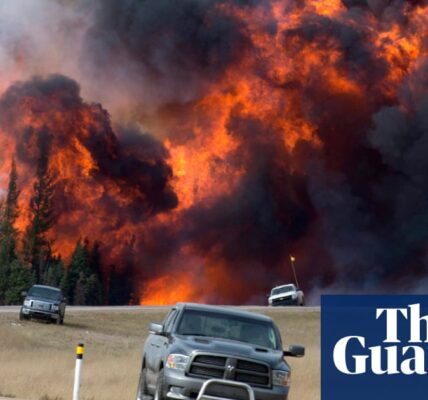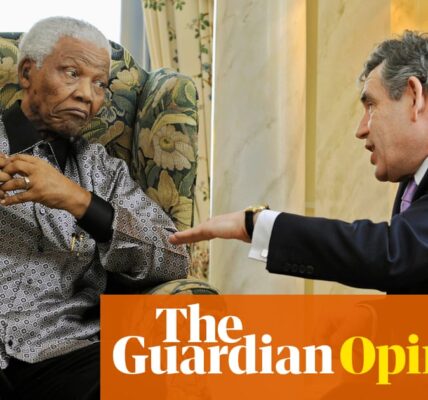Peter Dutton accused of trying to ‘rip up’ Australia’s commitment to Paris climate agreement

Peter Dutton has been accused of planning to break Australia’s commitment to the landmark Paris climate agreement after he said he would reject the country’s 2030 greenhouse gas reduction target.
The opposition leader reportedly told the Weekend Australian that he would oppose the legislated 2030 emissions target – a 43% cut compared with 2005 levels – at the next election but remain committed to reaching net zero emissions by 2050.
Dutton also reportedly conceded that the Coalition’s commitment to introduce nuclear power in Australia would not lead to plants being built before 2040, a point made by experts, and critics who have accused the opposition of planning to delay action to address the climate crisis.
-
Sign up for Guardian Australia’s free morning and afternoon email newsletters for your daily news roundup
The opposition leader said he would do more to promote the use of gas, a fossil fuel. He was quoted as saying there was “no sense in signing up to targets you don’t have any prospect of achieving”.
The News Corp story did not mention departmental projections that last year suggested the country was likely to make a 42% cut by 2030 based on an assessment of existing and announced policies. The government said it showed the 43% target was within reach.
Climate diplomacy experts said Dutton’s position could break Australia’s 2015 commitment to the Paris agreement, under which nearly 200 countries said they would aim to limit global heating to well below 2C and attempt to limit it to 1.5C above preindustrial levels.
The Paris deal, agreed with the Coalition was in power, says countries will progressively increase their commitments, and that pledges will reflect a nation’s “highest possible ambition”.
Erwin Jackson, the policy director with the Investor Group on Climate Change and an observer at international climate negotiations since the 1990s, said the Paris agreement was “absolutely clear” that countries could not backslide on emissions targets.
“It’s a core fundamental principle of the Paris agreement,” he said. “To make this position operational they would have to withdraw, which would leave us isolated in the international community.
“It would shatter confidence in our foreign policy and significantly undermine the ability for Australia to attract the investment it needs to get to net zero.
“It would send a signal to investors that Australia is not serious, is not prepared to do the hard work and they would just shift their money to other international jurisdictions.”
Richie Merzian, the acting chief executive of the Smart Energy Council and a former Australian climate diplomat, said the Paris agreement was painstakingly built “to ensure all countries meet their targets and increase their ambition to build trust among nations and investors”.
“There is no exception and no backsliding,” he said. “Reneging on our national commitment of 43% cuts by 2030 will damage Australia’s diplomatic, economic and moral standing.
“We have international investors lined up to back Australia’s smart energy revolution, which will lower energy bills and emissions. This will send them elsewhere.”
The climate change and energy minister, Chris Bowen, said Dutton’s comments showed he wanted to “rip up” the 43% emissions target. He said the opposition leader should say whether he had consulted the shadow cabinet and the Coalition joint party room about leaving the Paris agreement.
“The Paris accord is very clear. You can’t backslide. You can’t reduce your commitments. So is Mr Dutton proposing to leave the Paris accord or is the just hoping no one notices?” Bowen said. “At the moment the countries outside the Paris accord are Libya, Yemen and Iran. Is Mr Dutton proposing to take Australia into that company?”
Bowen said the government’s 43% emissions reduction target was “ambitious but achievable”.
“The latest emissions projections released in December show we are on track to achieve our 2030 target because of current policies including the safeguard mechanism, capacity investment scheme and new vehicle efficiency standards,” he said.
The Coalition’s climate change and energy spokesperson, Ted O’Brien, told reporters that the opposition was “committed to Paris, the 2050 net zero target” and said the legislated 43% target by 2030 was “unachievable” and a “Labor lie”.
O’Brien did not commit to the Coalition releasing emissions reduction targets for 2030 or 2035 before the election. “Our energy policy that will be released in due course,” he said.
Comment was also sought from Dutton’s office on whether the Coalition maintain a Morrison-era commitment to cut emissions by 26-28% by 2030.
Dutton has previously told the ABC’s Four Corners that the Coalition would take a more ambitious emissions target to the next election than the Morrison government’s pledge. “There’s no doubt about that,” Dutton told the program in September 2022.
Government climate data released late last month said national emissions were already 29% below 2005 levels.
Almost all of this was due to estimates of how much CO2 is absorbed by trees and the landscape. Emissions from the rest of the economy – including electricity generation, industry, transport and agriculture – were down less than 3% since 2005.
Australia has committed under the Paris agreement to announce an emissions reduction target for 2035 by February.
An initial assessment by the Climate Change Authority, the government’s advisory body, found Australia could meet an “ambitious” target to cut greenhouse gases by at least 65% and up to 75% by then. The authority’s final advice is due later this year.
Dutton reportedly told News Corp he would not commit to the 43% target because it would “destroy” agriculture and “create sovereign risk with our export partners”, Japan and South Korea.
Japan has promised to make a 46% cut in emissions by 2030 compared with 2013 levels. This is equivalent to a more than 40% cut using Australia’s 2005 baseline.
South Korea has a target of a 40% cut by 2030 compared with 2018 levels.
Source: theguardian.com




